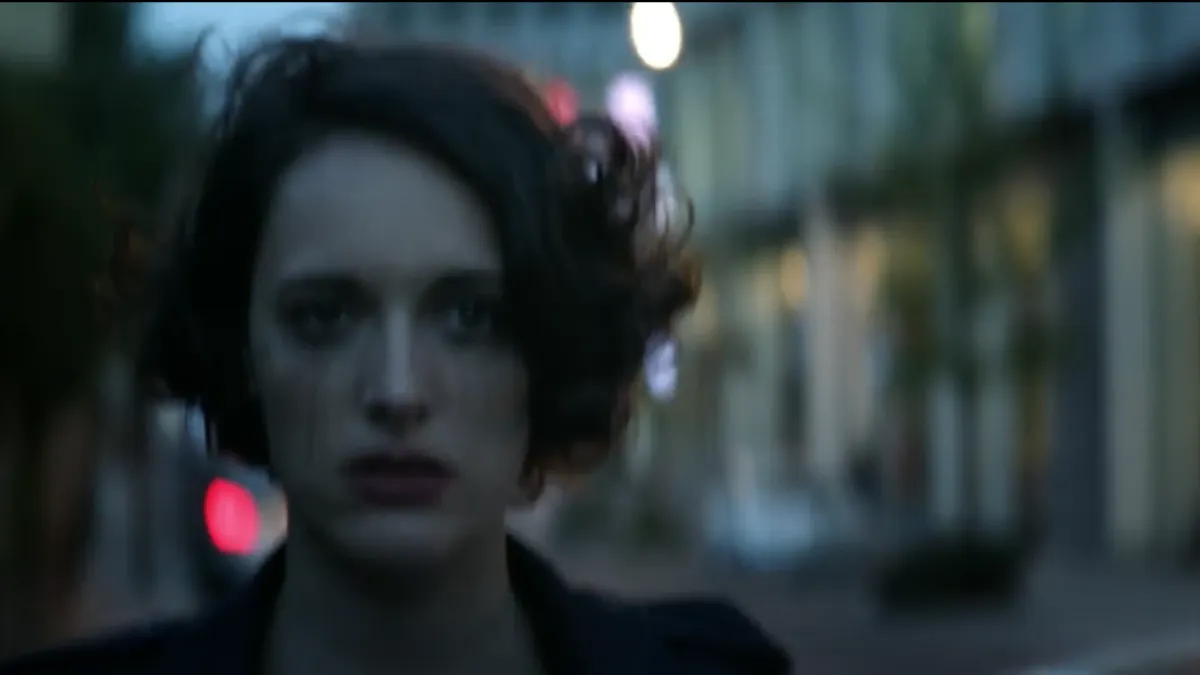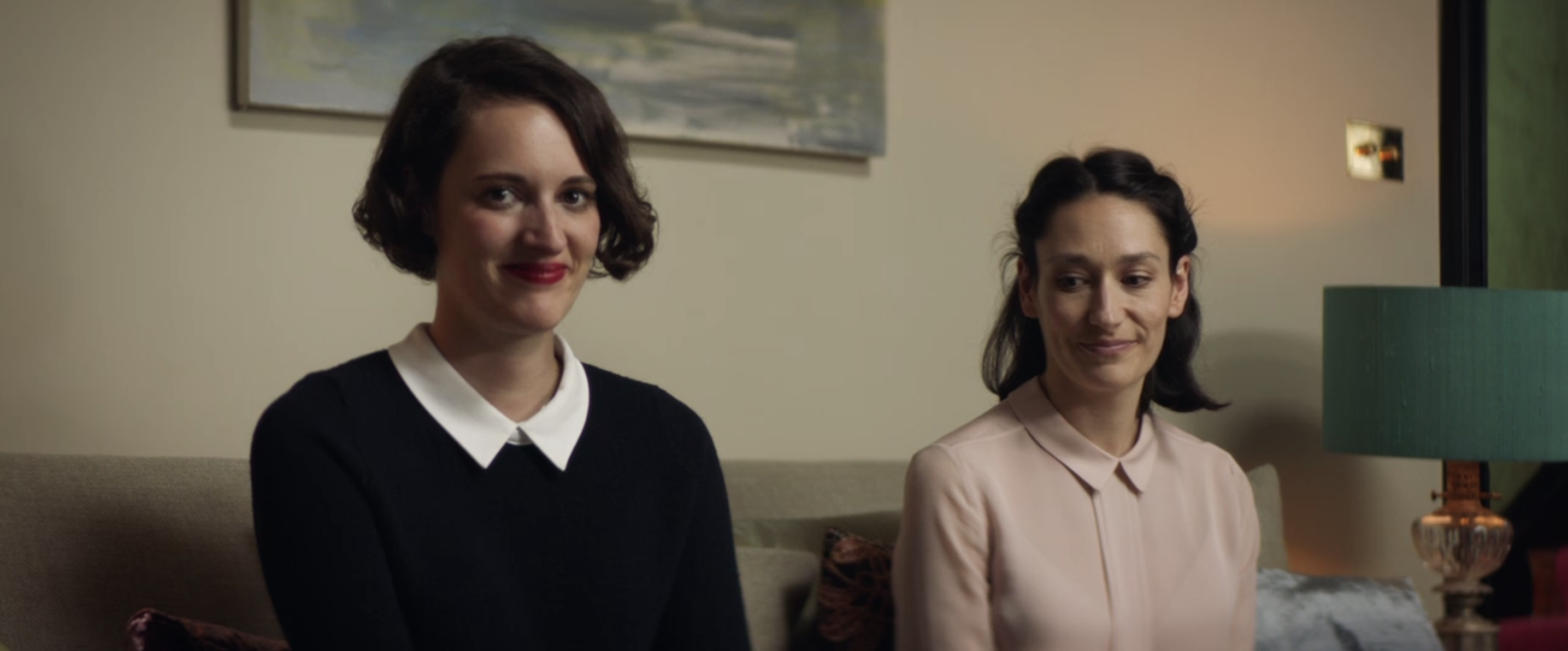Fleabag: "Season 1, Episode 5" and "Season 1, Episode 6"
In which we finally get to the heart of things

(This is the third installment of my weekly recaps of Fleabag, the Prime Video series that aired two seasons in 2016 and 2019. I love the show, and I wrote these reviews in 2020 when exploring the idea of doing a paid version of the newsletter. As such, they don't have all our regular features, but I hope you enjoy them anyway. These recaps are only available to paid subscribers.)
"Season 1, Episode 5"

Claire is my favorite Fleabag character and the one I relate to the most. When my younger sister was gleefully blowing up her life, many times over, I was trying to hold everything together by being the absolute best child my parents could have hoped for. But when it came time to confront the things inside of myself that I hadn’t wanted to talk about (i.e. when it came time to come out as transgender), who was the family member who was there for me? My very own Fleabag of a younger sister.
Fleabag’s penultimate episode of its first season revolves around the things Fleabag and Claire would rather not talk about, and the biggest thing they’d rather not talk about is the death of their mother. We never meet the two’s mom, who died well before the series began. But we do see the women haunted by her absence, both in the fact that they have to get breast cancer screenings and in the home that their mother once occupied that is now occupied by her one-time friend, Godmother.
It’s significant which characters within the world of Fleabag receive actual names. Claire, of course, is the one character whose name we can be relatively certain is her own. Boo has a name, though we might suspect it’s a nickname. And Claire and Fleabag’s mother has a name, too: Margaret. And yet we never see her, not even a photograph. Her absence colors everything that happens here. She doesn’t even get to be a ghost like Boo.
Speaking of Boo, this is the episode where we really understand how much the loss of her friend has colored everything that’s happened to Fleabag in the months since Boo’s death. At one point, Fleabag angrily corrects the idea that Boo died by suicide with the idea that it was just “an accident,” and her stubborn refusal to close down the café is reframed as a stubborn refusal to give up on her dead friend. Boo isn’t a character as much as she is a plot device – but she’s a really good plot device.
The season has been rather cunningly structured to keep pushing closer to Fleabag’s truest self at her core, and that’s why this next-to-last episode focuses so heavily on her family. We’ve gotten to see Dad and Godmother here and there, and we’ve gotten to see much more of Claire. But we haven’t gotten to spend an extensive amount of time with all of these people around the same table. (Very mild spoiler: The season premiere of the second season will revisit this basic setup to wildly different effect.) What we see is a family sublimating its pain beneath a series of rituals, like gathering to remember a dead mother who doesn’t haunt the proceedings so much as hang over them like a heavy fog.
I was going to write a thing about how Fleabag is a ghost story, but it felt a little over-determined, like I was pushing the show to be something that I wanted it to be. (To be clear: I think this reading is defensible, but let’s stick with the “mystery” framing for now.) Instead, let’s think about the ways that these characters, all living, haunt each other. Claire and Fleabag, in particular, seem haunted by a life they maybe once had and have subsequently lost. Maybe their relationship fractured in the wake of their mother’s death, or maybe it slowly evaporated over time, as so many relationships do without proper care and feeding.
I always ask myself why shows begin where they do, and the deeper we get into the first season of this show, the more it becomes obvious that Fleabag begins where it does because Fleabag is finally ready to build something new with somebody else. The genius of this first season is in how long it waits to reveal that that “somebody else” is Claire.
Just as long as Fleabag doesn’t chase her off to Finland first.
(I should call my sister.)
"Season 1, Episode 6"
Here’s an idea that I’ve often expressed in reviews that seems to throw readers: It is easy to accept love, but it is so, so difficult to believe you deserve that love. Often when I say this, people either take the tack of, “Wow, I never thought of it that way,” or they land on, “What? That’s not true! I definitely deserve love!”
So when I say “you,” what I mean is “me.” I have trouble feeling like I deserve love. Less than I used to but still, when I find out that I have a new friend, or when somebody wants to hang out with me, or when my wife tells me I’m beautiful, I often have to figure out if they have an ulterior motive. I don’t think of myself as my best self. I think of myself as the worst things I’ve ever done.
Maybe that’s why Fleabag season one resonated with me so much back when I first saw it in 2016. Everything in this run of episodes has forced Fleabag to confront a core truth about herself: She’s not entirely sure she’s deserving of love. Not after what she did to Boo. Not after the way she pushed everybody in her life away from her. Not after the way she turned her Godmother’s art show into something that was all about her pain and vulnerability again.
It’s rather remarkable how little Phoebe Waller-Bridge protects you from the devastation of these reveals either. Fleabag hasn’t been thinking about what she did, because it’s really painful to think about. When she finally does, she ends up nearly stepping out into traffic herself. The most famous shot of the first season – with Fleabag’s eyes black-ringed from tears and mascara – turns out to be its most devastating as well. Fleabag thinks nobody cares if she lives or dies, and honestly, you can see why she leaps to that conclusion. With her family largely isolated, what does she have left to live for?
And yet that’s what life is, in the end. You find ways to keep living, even when you aren’t sure why you are the one left alive. The bank manager finds Fleabag out on the street. He gives her a ride to the café. They have a chat about why she should qualify for a small business loan. Sometimes, the darkest hour really does come before the dawn.
There’s something inside of Fleabag that doesn’t dare examine its own class politics. The show obviously takes place in the world of the idle rich, and Fleabag’s own café makes little sense as a business enterprise. (It works perfectly as a symbol, so I cut it a bunch of slack.) What saves the day in the end is sort of the smoothing effects of money. Once the bank manager sits down to chat with Fleabag again, you know that the series is going to find its happy ending in her being able to continue this particular business venture in honor of her friend.
But the money is only a small part of why this ending is effective. The bank manager has no particular reason to show Fleabag a kindness, but he does. Just when everybody who has given her break after break after break has abandoned her – and especially Claire – here comes this person who has nothing to do with her, not really, and wants to find a way to help her keep living her life on her own terms.
Roger Ebert once famously said that the thing that moves him most in movies is kindness. The final meeting between Fleabag and the bank manager isn’t enough kindness to bury all of the horrible stuff that happens in this finale. Fleabag is going to have to work hard to get back on her feet. But it’s the first step carved into the wall of a gaping pit. Fleabag might not yet believe she is deserving of love. She might not believe she has boundaries where she ends and others begin. But she does have a café. That’s something to live for.
Next week: Fleabag took almost three years off between seasons, but season two was an awards juggernaut, all but sweeping the Emmys. We're going to kick it off next week with a season premiere that is delightful.



